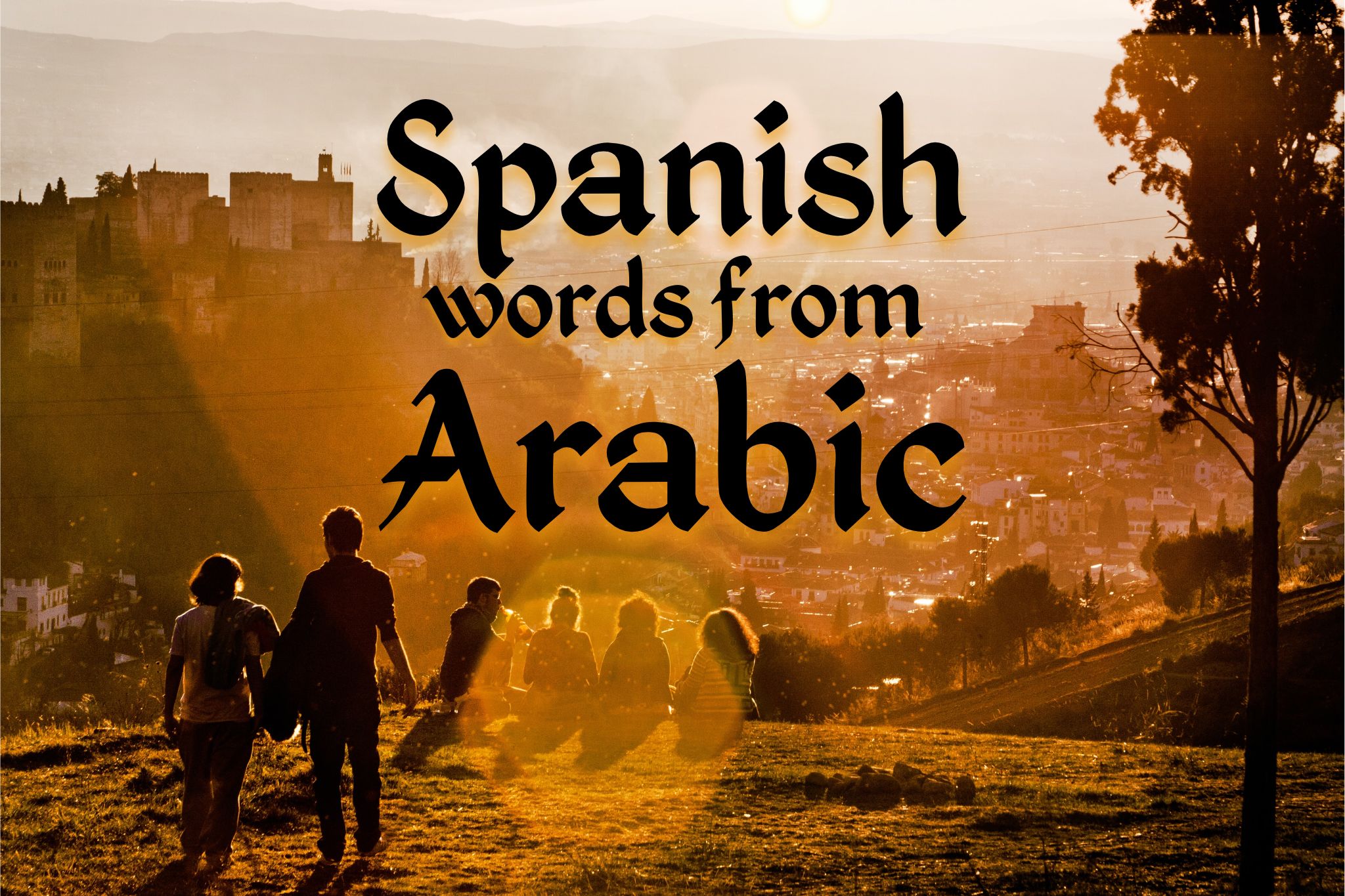Words in Spanish that come from Arabic: A historical journey of language

Get our free email course, Shortcut to Conversational.
Have conversations faster, understand people when they speak fast, and other tested tips to learn faster.
More infoSpanish, like many languages, carries a rich tapestry of linguistic influences. One of the most intriguing threads in this tapestry is the influence of Arabic, which weaves through the very fabric of the Spanish language.
In today’s post we’re embarking on an exploration of common words in Spanish that come from Arabic, intending to shed some light on the influence of Arabic in modern Spanish. We’ll start with some of the history behind this Arabic influence on Spanish, along with some of the curious morphological details that were inherited from the language. Then we’ll get into the vocab, presenting 48 Spanish words derived from Arabic.
Let’s get started on our cultural exploration!
Historical context
Many, many years ago, from 711 to 1492, Spain was under Muslim rule. For nearly eight centuries, Arabic was the dominant language of the Iberian peninsula! Obviously, this historical presence left a big mark on the evolution of Spanish culture, religion, and language.
In what would later become Spain, Christians, Muslims, and Jews lived together. They shared their ideas, customs, and words. This mixing of cultures made Arabic even more important in Spanish.
Even once Christianity became the dominant force in Spain, the Arabic words didn’t disappear. They’d been adopted into Spanish and are still used today. Most of the Spanish words derived from Arabic that we’ll look at today are for common things like food, nature, and everyday objects.
Morphological influence
Linguistic borrowings from Arabic are known as Arabisms. In Spanish, these words are mainly nouns, but we also find a few adjectives and verbs. They span various topics like farming, land, math, and the military.
One interesting thing is that many Arabic words in Spanish start with “al.” This is because in Arabic they use “al” as the article, like “the” in English. In Spanish, this article has evolved to el, la, los, and las. Andalusian Arabic joined the article to the words, and Spanish inherited the whole ensemble as these words became part of our lexicon.
It’s important to note that most Spanish Arabisms come from Hispanic Arabic or Andalusian Arabic. These were the dialects spoken in areas of the Iberian Peninsula during the Muslim rule from the 9th to the 17th century.
We’ve gathered information for this post from the Royal Academy of Spanish, which provided us with the etymological roots we’ll be presenting here. It’s entirely likely that the Andalusian Arabic words we share here are slightly different from their contemporary Arabic counterparts, or even from their equivalents in Classical Arabic. Language evolves a lot over the centuries!
Regardless of the dialect, the conclusion remains the same: Arabic influence on Spanish words has had a lasting effect on the language we speak to this day.
Spanish words that come from Arabic
Now that we’ve touched on the cultural and morphological history of Arabic influence on Spanish language, it’s time for the fun part. Let’s get into our lists of Spanish words derived from Arabic!
We’ll break these Spanish Arabisms down into a few categories. We’ll start each section with a summary of the Spanish words from Arabic in that category, and then we’ll give an explanation for each individual word.
Food
Arabic influence on Spanish language is clear through the names of many foods that have been consumed for millennia around the Mediterranean basin. Let’s take a look.
| Spanish word | Hispanic Arabic word | Arabic word | English |
| Aceite | Azzáyt | الزيت | Oil |
| Aceituna | Azzaytúna | الزيتون | Olive |
| Albahaca | Alhabaqa | الحبق | Basil |
| Albaricoque | Albarqúq | البرقوق | Apricot |
| Albóndiga | Albúnduqah | البندقة | Meatball |
| Alcohol | Alkuḥúl | الكحول | Alcohol |
| Azúcar | Assúkkar | السكر | Sugar |
| Azafrán | Alzafarán | الزعفران | Saffron |
| Bellota | Balloṭa | بَلُّوط | Acorn |
| Berenjena | Baḏinǧána | باذنجان | Eggplant |
| Café | Qahwah | قهوة | Coffee |
| Fideo | Fidāwiš | فِدَاوِش | Noodle |
| Jarabe | Šaráb | شراب | Syrup |
| Limón | Lamún | ليمون | Lemon |
| Lima | Lima | لِيمَة | Lime |
| Naranja | Naranǧa | نارنج | Orange |
| Sandía | Sandíyya | سِنْدِيَّة | Watermelon |
| Zanahoria | Safunnárya | اسفنارية | Carrot |
Aceite – Oil
The Spanish word “aceite” comes from the Andalusian Arabic word “azzáyt,” which in turn originated from Classical Arabic “zayt” (زَيْت), meaning olive juice.
Aceituna – Olive
Similarly, the word for “olive” comes from the Andalusian Arabic “azzaytúna,” which is derived from Classical Arabic “zaytūnah” (زَيْتُون).
Albahaca, Albaca – Basil
The word for basil in Spanish comes from the Andalusian Arabic alḥabáqa, which comes from Classical Arabic “ḥabaqah.” (احبق), the name given by Arabs to aromatic plants used in cooking and medicine.
Albaricoque – Apricot
The word “albaricoque” originally comes from Latin “praecoqua,” which is derived from the verb “praecoquere,” meaning “to ripen prematurely.” However, the Andalusian Arabic variant “albarqúq” shaped the current word, which in turn came from Classical Arabic “burqūq” (برقوق).
Albóndiga – Meatball
In Spain, the invention of the meatball has traditionally been attributed to the Arabs. This Spanish word comes from Andalusian Arabic “albúnduqa,” which, as always, comes from Classical Arabic “al-bunduqah” (البندقة), which literally means hazelnut and which is used figuratively to describe something small and round.
The story goes even further, back to ancient Greek, where hazelnuts were called “kárya pontiká” (κάρυα ποντικά), meaning “nuts from the Pontus,” referring to the Black Sea, which they called the Euxine Sea. The name for these “pontiká” nuts made its way into Arabic as “búndiqa” (بندقة). Once adopted into Arabic, the word was used not only to refer to hazelnuts but also broadly to other things that were the size and shape of a hazelnut.
Alcohol – Alcohol
The word “alcohol” entered the Spanish language through Andalusian Arabic as “alkuḥúl,” originating from Classical Arabic “kohol” (كحول), meaning “subtle.” Initially, this term was used to describe a cosmetic product made from antimony powder that women used as eye makeup. The manufacturing process of “kohol” involved a dissolution. Over time, this word began to be used to refer to any substance that had been refined to its essence.
Azúcar – Sugar
The word “azúcar” is derived from the Arabic word “sukkar” (سكر), which was introduced into the Spanish language through Andalusian Arabic as “assúkkar.”
Azafrán – Saffron
The name of this spice from Asia Minor entered Spanish through Andalusian Arabic as “azza‘farán,” which in turn originated from Classical Arabic “za‘farān” (زعفران).
Bellota – Acorn
The word for the name of this oak tree nut, beloved by squirrels, entered Spanish through Andalusian Arabic as “ballúṭa,” which came from Classical Arabic “ballūṭa” (بَلُّوط).
Berenjena – Eggplant
This word originally comes from Sanskrit and had many variations. When it passed into Persian and then into Arabic, it also had various forms in both written texts and dialects. The form “bāḏinǧānah” (باذنجان) in Classical Arabic became “baḏinǧána” in Andalusian Arabic, ultimately becoming “berenjena” in Spanish.
Café – Coffee
The word “café” comes from the Arabic qahwa (قَهْوَة), meaning “stimulating drink.” This word, in turn, comes from the name of the region of Kaffa in Ethiopia, where coffee is believed to have originated. The word “café” entered Spanish through Italian “caffè,” which in turn comes from Turkish “kahve.”
Fideo – Noodle
The word “fideo” is used to refer to a type of thin, elongated pasta often served with sauces or in soups. It originates from Andalusian Arabic “fidāwiš” (فِدَاوِش), with uncertain origins. It may also have some relation to the Arabic verb “faydān” (فيضان), meaning “to overflow or protrude,” as pasta tends to expand and protrude when boiled.
Jarabe – Syrup
“Jarabe” comes from Classical Arabic “šarāb” (شَرَاب), pronounced in Andalusian Arabic as “šaráb,” both meaning “drink.” Initially, this word was written in Spanish as “xarabe” and pronounced as “sharabe.” With the evolution of the Spanish language, it became “jarabe.”
Limón – Lemon
The word for describing the fruit of the lemon tree comes from Andalusian Arabic “lamún,” which, in turn, derives from Classical Arabic “laimūn” (ليمون).
Lima – Lime
In Spanish, this word has several homographs, meaning words spelled the same but with different origins and meanings.
“Lima,” referring to the fruit, comes from Andalusian Arabic “lima,” which, in turn, comes from Classical Arabic “līmah” (ليمة).
Its homograph, “lima,” on the other hand, referring to a file for smoothing or sharpening metal or wood, comes from Latin “limus,” which refers to “a bevel.”
Naranja – Orange
The word naranja in Spanish comes from Andalusian Arabic “naranğa,” which, in turn, comes from Classical Arabic “nāranğ” (نارنج). Initially, this word referred to bitter oranges, and not the sweet ones commonly consumed today.
When Portuguese explorers introduced new citrus fruits in the 14th century, similar in appearance to bitter oranges but sweeter in taste, they were called “naranjas” in Spanish as well, but specifying their place of origin, such as “naranjas de la China” and “naranjas mandarinas.”
Nowadays in Arabic, sweet oranges are called “burtuqal” (برتقالي), which comes from Portugal, the country that brought them, while bitter oranges retain their original name “nāranğ” (نارنج).
Sandía – Watermelon
The word “sandía” comes from the Arabic “sindíyya” (سندية), which means “from Sind.” Sind is a region in Pakistan from where this fruit was introduced to the eastern Arabs.
When this fruit reached Al-Andalus, it came with several names. The most common was the traditional word for melon, which was “baṭṭīḫa” (بَطِّيخَة), followed by the region of its origin, as “baṭṭīḫa sindíyya,” meaning “melon from Sind.” This is how it became “sandíyya” in Andalusian Arabic and finally “sandía” in Spanish.
Currently in Arabic, “baṭṭīḫa” (بَطِّيخَة) is used exclusively to refer to watermelon. Interestingly, this word also gave rise to the word “patilla,” which is the word for watermelon used in Colombia, Venezuela, Puerto Rico, and the Dominican Republic.
Zanahoria – Carrot
The word “zanahoria” comes from Andalusian Arabic “safunnárya,” which, in turn, comes from Classical Arabic “isfannāriyya” (اسفنارية). This Arabic word, in turn, has its roots in the Greek “staphylínē agría” (σταφυλίνη ἀγρία), meaning wild carrot.
Nature
We continue to see Arabic influence on Spanish when we look at a number of words for the natural and domesticated environs of the greater Mediterranean region. Let’s see a few of these Spanish words derived from Arabic related to nature.
| Spanish word | Hispanic Arabic word | Arabic word | English |
| Algodón | Alquṭún | القطن | Cotton |
| Arrecife | Arraṣíf | الرصف | Reef |
| Jabalí | Ǧabalí | جبلي | Boar |
| Jirafa | Zurāfah | زَرَافَة | Giraffe |
| Marfil | Aẓm alfíl | عَظْم اَلْفِيل | Ivory |
| Tabaco | Tubbaq | طباق | Tobacco |
Algodón – Cotton
Both the English word “cotton” and its Spanish counterpart “algodón” come from the Andalusian Arabic “alquṭún,” which in turn was derived from the Classical Arabic “quṭn” (قُطْن).
Arrecife – Reef
A reef is a submerged rocky formation that can be dangerous for navigation. The word comes from Andalusian Arabic “arraṣíf,” which means “dam” or “causeway.” This term stems from the Classical Arabic word “raṣīf” (رَصِيف), meaning pavement.
Jabalí – Wild Boar
The Spanish word “jabalí” originates from Classical Arabic “gabalī” (جَبَلِيّ), meaning “mountainous” or “wild,” which is an adjective. It comes from the Arabic word for mountain, “ǧabal” (جبل). In Andalusian Arabic, “ǧabalí” was used to describe a “wild pig.”
Jirafa – Giraffe
The word “jirafa” entered the Spanish vocabulary through the Italian word “giraffe.” Looking further into its etymological history, however, and we see that the words for “giraffe” in Spanish, Italian, and English ultimately come from the Arabic “zarāfa” (زَرَافَة).
Marfil – Ivory
The Spanish word “marfil” comes from Andalusian Arabic “ˁaẓm alfíl,” which means “elephant bone.” This is derived from the Arabic words “ˁaẓm,” meaning “bone,” and “fīl,” which means “elephant.”
Tabaco – Tobacco
The Spanish word “tabaco” stems from the Classical Arabic “ṭub[b]āq” (طُبَّاق), a term that was originally used, before the discovery of the Americas, for medicinal herbs like the olive herb and eupatorium that caused dizziness or numbness. The contemporary Arabic word for the familiar American plant known for its nicotine is “tibḡ” (تَبْغ) or “tabḡ” (تِبْغ).
Grammatical expressions
Let’s look at a couple of Spanish words with Arabic origins that are used primarily for their grammatical roles in a sentence.
| Spanish word | Hispanic Arabic word | Arabic word | English |
| Ojalá | Law šá lláh | لو شاء الله | God willing |
| Hasta | Hattá | حتّى | Until |
Ojalá – God willing
The Spanish word ojalá, which triggers the Spanish subjunctive, comes from the Arabic phrase “law šá Alláh,” (لو شاء الله) or “in šá Alláh” (إن شاء الله), which means “God willing” or “if God wills.”
Hasta – Until
The Spanish word for “until” is the result of the convergence of an Arabic preposition with a Latin expression. Andalusian Arabic used the preposition “hattá,” from classical Arabic “ḥattà” (حتّى), meaning “up to this point.” This merged with Latin “ad ista,” meaning “up to that,” to form “hasta.”
Everyday Spanish words from Arabic
Here are some other miscellaneous Spanish words that come from Arabic. As you can see, there are quite a few, demonstrating the broad Arabic influence on Spanish language.
| Spanish word | Hispanic Arabic word | Arabic word | English |
| Ajedrez | Aššaṭranǧ | الشطرنج | Chess |
| Alfil | Alfil | الفيل | Bishop (Chess piece) |
| Albanní | Albañil | البنّاء | Construction worker |
| Alcalde | Alqáḍi | اَلْقَاضِي | Mayor |
| Aldea | Aḍḍáy‘a | الضيعة | Village |
| Alquiler | Alkirá | الكِراء | Rent, Rental |
| Álgebra | Alǧabru | الجبر | Algebra |
| Algoritmo | al-ḵawārizmiyy | الخَوَارِزْمِيّ | Algorithm |
| Asesino | Ḥaššāšīn | حشاشين | Assassin |
| Barrio | Bárri | بري | Neighborhood |
| Dado | A‘dād | أَعْدَاد | Dice |
| Diván | Dīwān | ديوان | Divan |
| Elixir | Al’iksīr | اَلْإِكْسِير | Elixir |
| Guitarra | Qīṯārah | قيثارة | Guitar |
| Hazaña | Ḥasána | حَسَنَة | Feat, Deed |
| Jarra | Ǧárra | جَرَّة | Jug, Jar |
| Mazmorra | Maṭmúra | مطمورة | Dungeon |
| Mezquino | Miskín | مِسْكِين | Mean, Petty, Stingy |
| Momia | Mummiya | مُومِيَاء | Mummy |
| Noria | Na‘úra | نَاعُورَة | Waterwheel, Noria |
| Tarea | Ṭaríḥa | طَرِيحَة | Task, Homework |
| Taza | Ṭássa | طَسَّة | Cup |
Ajedrez – Chess
Chess is a game that originated more than four thousand years ago. The Chinese brought it to India, where it was called “chaturanga,” which means “four forces,” referring to the four divisions of the Indian army: chariots, elephants, cavalry, and infantry.
The name “chaturanga” gradually evolved as the game spread across the world. In Arabic it was called “šiṭranǧ” (شِطْرَنْج), and in Andalusian Arabic, it was referred to as “aššaṭranǧ” or “aššiṭranǧ.” In Spanish the name was adopted as “acedrex,” pronouncing the ‘x’ like your English ‘h.’ The order of the syllables in this word gradually underwent a change and transformed into “axedreç,” which is written in modern Spanish as “ajedrez.”
Alfil – Bishop (in Chess)
The etymology of the word “alfil” derives from the Andalusian Arabic “alfíl,” which, in turn, comes from Classical Arabic “al-fil” (الفيل), meaning “the elephant.” This designation is rooted in the Persian word “pil,” which also means “elephant.” Originally, this chess piece symbolized elephants in armies and later came to represent the bishop because the shape of the piece resembled the mitre worn by bishops.
Albañil – Mason, Builder
“Albañil” is the Spanish word for “a mason” or “a builder.” This word comes from “al-banní,” which is the Andalusian dialectal pronunciation of the Classical Arabic “bannā” (بَنَّاء), including the article “al-” (ٱلْـ) at the start of the noun as is the norm in Arabic.
Alcalde – Mayor
“Alcalde” comes from Andalusian Arabic “alqáḍi,” which is derived from “qāḍī” (قاضي), meaning “judge.” Initially “alcalde” kept the same meaning, but over time, following the social and political changes in the society, “alcalde” came to be the title of the highest position in municipal government.
Aldea – Village
The Spanish word “aldea” comes from Andalusian Arabic “aḍḍáy‘a,” which in turn comes from Classical Arabic “ḍay‘ah” (ضَيْعَة), meaning “farm.”
Alquiler – Rental
“Alquiler” comes from Hispanic Arabic “alkirá” or “alkirí,” which, in turn, comes from Classical Arabic “kirā” (كِرَاء). This is the name of the action of the verb “kārà” or “yukārī,” which means “to rent” or “to lease.”
Álgebra – Algebra
The name of this branch of mathematics entered Spanish through late-Latin “algĕbra,” which, in turn, has its roots in Classical Arabic “al-ğabr” (الجبر). This term is derived from the title of the famous Arabic mathematical treatise on algebra, “al-Kitāb al-mukhtaṣar fī ḥisāb al-ŷabr wa-l-muqābala” (الكتاب المختصر في حساب الجبر والمقابلة), or “The Compendious Book on Calculation by Completion and Balancing” in English.
Algoritmo – Algorithm
The term for “algorithm” entered Spanish through Medieval Latin “algorismus,” which has its roots in Arabic and comes from “al-Khwārizmī (الخوارزمي),” the nickname of the famous mathematician Muhammad ibn Musa. “Khwārizmī” means “from Khwārizm,” which was Ibn Musa’s birthplace and the title of his renowned mathematical thesis.
Asesino – Assassin
The word “asesino” has an interesting etymology. It comes from the Arabic word “ḥaššāšīn” (حَشَّاشِين), which means “consumers of hashish.” This term was used to refer to the Nizarites, an Islamic sect that existed in the Middle East during the Middle Ages, famous for their tactics of selective assassination.
Barrio – Neighborhood, Slum
The word “barrio” comes from Andalusian Arabic “bárri,” which meant “exterior” or “what was beyond the city walls.” This, in turn, comes from classical Arabic “barrī” (بَرِّيّ), which means “wild.”
Dado – Dice
The origin of this word is uncertain, but one possibility is that it comes from Arabic “a‘dād” (أَعْدَاد), which means numbers.
Diván – Divan
A “diván” is a piece of furniture for sitting or reclining, similar to a sofa but longer. Divans received this name because they were usually found along the walls of conference rooms in the Middle East, in a section called “dīwān” (ديوان), which means “a list” or “a register,” and by extension, “a council.”
Elixir – Elixir
This mythical word entered Spanish through Medieval Latin, preserving its spelling. However, it comes from the Arabic word “iksir” (إِكْسِير) or “al-iksir” (اَلْإِكْسِير), which was used to refer to the philosopher’s stone, believed to be capable of turning objects into gold and granting immortality. Today it has other meanings in Spanish, such as a liquor with medicinal substances or a miraculous medicine.
Guitarra – Guitar
The name of this instrument is borrowed directly from the Arabic word “gitara” (قيثارة).
Hazaña – Feat, Deed
“Hazaña” derives from Andalusian Arabic “ḥasána,” and this from Classical Arabic “ḥasanah” (حَسَنَة), meaning “good deed.” This Arabic term was also influenced by the old Spanish verb “fazer,” which means “to do.” It is likely that speakers confounded these two terms, resulting in the appearance of “fazaña.” The pronunciation evolved whereby the “f” gradually became an “h,” leading to today’s Spanish word “hazaña.”
Jarra – Jar, Jug
This word entered Spanish through Andalusian Arabic “ǧárra,” and this from Classical Arabic “ǧarrah” (جَرَّة). This is also the origin of “jar” in English.
Mazmorra – Dungeon
The word “mazmorra” comes from Andalusian Arabic “matmúra,” and this from Classical Arabic “matmūrah” (مطمورة), which meant “silo,” “cellar,” or “granary,” especially one located underground. However, it also came to mean “underground prison,” which is the meaning it took when becoming a Spanish word.
Mezquino – Poor, Petty, Stingy
“Mezquino,” which translates to “petty,” “poor,” or “stingy” in English, comes from Andalusian Arabic “miskín,” and this from classical Arabic “miskīn” (مِسْكِين). The sense of “stingy” developed in the early modern period.
Momia – Mummy
The word “momia” comes from Arabic “mūmiya” (مُومِيَاء), which was a type of wax used by ancient Egyptians to preserve bodies during the mummification process.
Noria – Waterwheel
The Spanish word “noria” comes from Andalusian Arabic “na‘úra,” and this from classical Arabic “nā‘ūrah” (ناعورة), which means “to creak” due to the noise this device makes.
The “i” in “noria” was added through the influence of the Arabic word “sāniya” (سَانِيَة), which means elevator, which is a device similar to a “noria” or “waterwheel.” Interestingly, this word also resulted in an Arabic loanword in Spanish, becoming “assánya” in Andalusian Arabic and finally “aceña” in Spanish, meaning “a mill.”
Tarea – Task, Homework
The Spanish word “tarea” comes from Arabic “ṭaríḥa” (طريحة), which means “assignment” or “work that must be done in a short time.” This comes from the root “trh” (طرح), which means “to throw,” “to launch,” or “to assign.”
Taza – Cup
“Taza” comes from Andalusian Arabic “ṭássa,” and this from classical Arabic “ṭassah” (طَسَّة), which originally meant “basin” and later evolved into “cup” in modern Spanish. In modern Arabic, what we know as “a cup” is called “finğān” (فِنْجَان) or “finğāl” (فِنْجَال).
Conclusion
The influence of Arabic in Spanish is nothing short of fascinating. It’s like discovering hidden gems in a well-worn path. As we wrap up this exploration, let’s recap our journey through the influence of Arabic on Spanish language and culture.
We started by diving into history, where we learned about the Muslim rule of Spain and how the Arabic language was part of everyday life across the Iberian peninsula. The coexistence of Christians, Muslims, and Jews enriched this influence.
Then we explored the linguistic side, discovering that a majority of the Arabic words in Spanish are nouns, but that adjectives and verbs have also made their way into the language. The “al” at the beginning of many Spanish words, echoing the Arabic definite article, sets them apart in a unique way.
We categorized these Arabic words into lists, starting with the delectable world of food, where everyday ingredients like “aceite” (oil) and “azúcar” (sugar) bear traces of their Arabic origins. We ventured into nature, where “jirafa” (giraffe) and “tabaco” (tobacco) showed us that even some common English words have Arabic roots. We even encountered grammatical elements like “ojalá” (God willing), revealing how the Arabic influence on Spanish extends beyond tangible objects.
Finally, we explored miscellaneous words that reflect the wide-reaching impact of Arabic on Spanish, from “guitarra” (guitar) to “jarra” (jug), each word bearing its own unique story.
In total, we’ve unveiled nearly 50 Spanish words that have traveled through time and culture, originating in Arabic and becoming an integral part of the Spanish language.
We hope this journey on the similarities between Spanish and Arabic has been as enlightening and enjoyable for you as it has been for us! The enduring Arabic influence on Spanish adds layers of depth to both the language and the culture that we’ve certainly enjoyed learning about today. Stay curious, and we look forward to sharing more linguistic adventures with you in future posts. See you next time!



